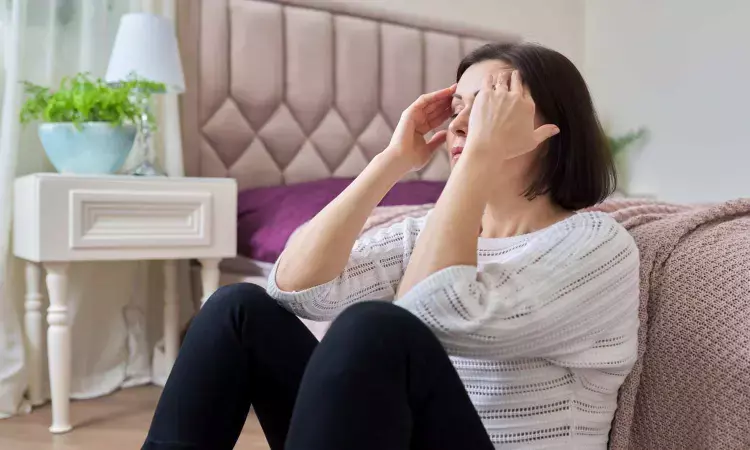- Home
- Medical news & Guidelines
- Anesthesiology
- Cardiology and CTVS
- Critical Care
- Dentistry
- Dermatology
- Diabetes and Endocrinology
- ENT
- Gastroenterology
- Medicine
- Nephrology
- Neurology
- Obstretics-Gynaecology
- Oncology
- Ophthalmology
- Orthopaedics
- Pediatrics-Neonatology
- Psychiatry
- Pulmonology
- Radiology
- Surgery
- Urology
- Laboratory Medicine
- Diet
- Nursing
- Paramedical
- Physiotherapy
- Health news
- Fact Check
- Bone Health Fact Check
- Brain Health Fact Check
- Cancer Related Fact Check
- Child Care Fact Check
- Dental and oral health fact check
- Diabetes and metabolic health fact check
- Diet and Nutrition Fact Check
- Eye and ENT Care Fact Check
- Fitness fact check
- Gut health fact check
- Heart health fact check
- Kidney health fact check
- Medical education fact check
- Men's health fact check
- Respiratory fact check
- Skin and hair care fact check
- Vaccine and Immunization fact check
- Women's health fact check
- AYUSH
- State News
- Andaman and Nicobar Islands
- Andhra Pradesh
- Arunachal Pradesh
- Assam
- Bihar
- Chandigarh
- Chattisgarh
- Dadra and Nagar Haveli
- Daman and Diu
- Delhi
- Goa
- Gujarat
- Haryana
- Himachal Pradesh
- Jammu & Kashmir
- Jharkhand
- Karnataka
- Kerala
- Ladakh
- Lakshadweep
- Madhya Pradesh
- Maharashtra
- Manipur
- Meghalaya
- Mizoram
- Nagaland
- Odisha
- Puducherry
- Punjab
- Rajasthan
- Sikkim
- Tamil Nadu
- Telangana
- Tripura
- Uttar Pradesh
- Uttrakhand
- West Bengal
- Medical Education
- Industry
COVID-19-like symptoms and not COVID19 infection tied to long-term depression, anxiety: JAMA

France: A cohort study of more than 45,000 individuals from the general population has suggested that SARS-CoV-2 infection is not a risk factor for long-term mental health issues (depression, anxiety).
The study, published in JAMA Network Open, revealed that COVID-19–like symptoms, but not SARS-CoV-2 infection during the pandemic's first month was associated with increased anxiety and depression eight months or more after COVID-19 symptoms, even when SARS-CoV-2 serologic test results were negative.
"In our opinion, one of the most compelling study results was the finding that SARS-CoV-2 seropositivity was not associated with depression or anxiety, the researchers wrote.
Mental health issues are increasingly being observed in survivors of SARS-CoV-2 infection. Until recently, the high depression incidence following SARS-CoV-2 infection has been reported in patients hospitalized for COVID-19 without a control condition. Also, the long-term consequences of COVID-19 on mental health is a critical issue, provided the number of people infected with SARS-CoV-2 worldwide since the pandemic began.
Against the above background, Alexandra Rouquette and colleagues from France sought to investigate the associations between self-reported COVID-19–like symptoms or SARS-CoV-2 seropositivity and subsequent anxiety or depression.
The study was initiated in May 2020, with follow-ups in November 2020 and July 2021. The researchers used data from EpiCoV, a large, randomly selected, national population–based cohort from France. Eighty-five thousand seventy-four individuals 15 years or older completed the questionnaires at the three-collection times; 28 568 were excluded as they failed to return a blood sample for serologic testing, 1994 because of incomplete data, and 9252 to respect the temporal sequence (exposure must precede the outcome).
The researchers computed propensity scores based on various lifestyle, socioeconomic, and health variables to match participants who experienced COVID-19–like symptoms between February and November 2020 or showed SARS-CoV-2 seropositivity in November 2020. The associations between these occurrences and anxiety or depression were estimated using the Generalized Anxiety Disorder 7-item, and the Patient Health Questionnaire 9-item scales, respectively.
The authors reported the following findings:
Among the 45 260 included participants (mean age, 51.1 years; 52.4% women; 8.0% with depression and 5.3% with anxiety in July 2021), COVID-19–like symptoms were associated with subsequent depression (adjusted odds ratio, 1.70) and anxiety (adjusted OR, 1.57), whereas SARS-CoV-2 seropositivity was not.
COVID-19–like symptoms, but not anosmia or dysgeusia alone, were associated with subsequent depression and anxiety in both the seropositive and seronegative subgroups.
"Our findings indicate that SARS-CoV-2 infection is not a risk factor for long-term depression or anxiety; however, further research is required to identify factors other than SARS-CoV-2 infection implied in the association between COVID-19–like symptoms and poor mental health outcomes," the authors conclude.
Reference:
Rouquette A, Descarpentry A, Dione F, et al. Comparison of Depression and Anxiety Following Self-reported COVID-19–Like Symptoms vs SARS-CoV-2 Seropositivity in France. JAMA Netw Open. 2023;6(5):e2312892. doi:10.1001/jamanetworkopen.2023.12892
Dr Kamal Kant Kohli-MBBS, DTCD- a chest specialist with more than 30 years of practice and a flair for writing clinical articles, Dr Kamal Kant Kohli joined Medical Dialogues as a Chief Editor of Medical News. Besides writing articles, as an editor, he proofreads and verifies all the medical content published on Medical Dialogues including those coming from journals, studies,medical conferences,guidelines etc. Email: drkohli@medicaldialogues.in. Contact no. 011-43720751


